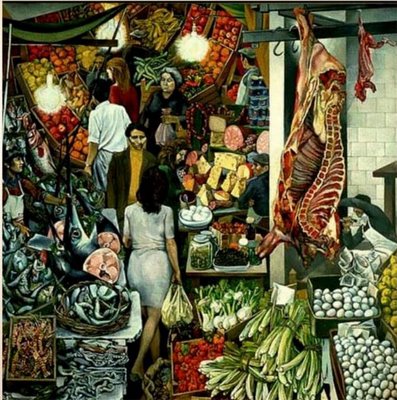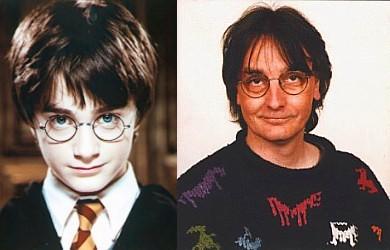
I’ve just had a thoroughly good time reading Stella Gibbons’ ‘Cold Comfort Farm’, and marvelling that a satirical novel published in 1932 could still be so much fun, long after the sources of the joke have faded or disappeared entirely.
It was intended as a satire of the fashionable rural novels of the time, sending up authors who are mostly forgotten or of interest only because she did them over. The exception is D.H. Lawrence, who was only the most self-consciously highbrow exemplar of the style.
For a first novel by a young woman in her twenties, when most novels were not by young women let alone those in their twenties, it is astonishingly self-assured and full of energy. She was a journalist and book-reviewer at the time and I can imagine the implied pressure not to burn bridges with those she might bump into at the next cocktail party, not to mention those who might employ her in the future. What a gamble.
In a strange, knowing flourish, she even flags paragraphs with an asterisk when she’s being particularly naughty, on a scale from one to three. Hence:
*** The man’s big body, etched menacingly against the bleak light that stabbed in from the low windows, did not move. His thoughts swirled like a beck in spate behind the sodden grey furrows of his face. A woman… Blast! Blast! Come to wrest away from him the land whose love fermented in his veins like slow yeast. She-woman. Young, soft-coloured, insolent. His gaze was suddenly edged by a fleshy taint. Break her. Break. Keep and hold and hold fast the land. The land, the iron furrows of frosted earth under the rain-lust, the fecund spears of rain, the swelling, slow burst of seed-sheaths, the slow smell of cows and cry of cows, the trampling bride-pride of the bull in his hour. All his, his…
Phew! And the punch line:
He stood at the table facing Flora and blowing heavily on his tea and staring at her. Flora did not mind. It was quite interesting: like having tea with a rhinoceros.
I have seen the more recent
film of the book, directed by John Schlesinger and featuring Ian McKellan and Eileen Atkins. Even after reading the novel, I still think it is extremely good. It actually adds something to the experience of reading the book. I heard their broad rustic accents in my head as I went.
Some juicy bits. McKellan as amateur preacher Amos, discovers his gift move the humble folk of the Church of the Quivering Brethren with terrible enthusiasm:
"Ye miserable, crawling worms, are ye here again, then? Have ye come like Nimshi son of Rehoboam, secretly out of yer doomed houses to hear what’s comin’ to ye? Have ye come, old and young, sick and well, matrons and virgins (if there is any virgins among ye, which is not likely, the world bein’ in the wicked state it is), old men and young lads, to hear me tellin’ o’ the great crimson lickin’ flames o’ hell fire?"
. . .
In novels, persons who turned to religion to obtain the colour and excitement which everyday life did not give them were all grey and thwarted. Probably the Brethren would be all grey and thwarted… though it was too true that life as she is lived had a way of being curiously different from life as described by novelists.
I kept wondering what George Orwell would have made of Stella Gibbons. As, I suppose, a good journalist, her prose showed all the virtues of concision and clarity that he regarded so highly. As a novel with a political heart, he would have found its lack of class consciousness highly questionable, and her feminism just a little beyond his definition of progressive, as limited by his time and place as that was. I searched the index of the ‘Collected Essays, Journalism and Letters’ without result. A pity, but she would have found his asceticism a bit much, not to mention his lack of a sense of humour. Cheer up you earnest old socialist and have a glass of champagne!
They would have bonded over a shared disdain for literary and cultural pretension. Here is Mybug, a sexually obsessed intellectual, as he attempts to engage in fruitful conversation with a visiting Hollywood talent scout, a Mr Earl P. Neck, on the lookout for the next matinee idol.
“’Have you ever seen Alexander Fin?’ asked Mr Mybug. I saw him in Pepin’s last film, ‘La Plume de Ma Tante’, in Paris last January. Very amusing stuff. They all wore glass clothes, you know, and moved in time to a metronome.”
The heart of the novel is Gibbons’ heroine (and alter ego, given that she was herself a smart go-getter under thirty) Flora Poste, a new woman, one of the bright young things, wilful, assertive, with a very low tolerance for self indulgence and a passion for tidiness in all its forms:
She liked Victorian novels. They were the only kind of novel you could read while you were eating an apple.
One of the advantages of almost universal education was the fact that all kinds of persons acquired a familiarity with one’s favourite writers. It gave one a curious feeling; it was like seeing a drunken stranger wrapped in one’s dressing gown.
All the inmates of Cold Comfort sustain themselves on various fruits of misery, which each of them invokes to justify their refusal to engage with life and its real potential. “I saw something nasty in the woodshed!” screams the gothic Aunt Ada from her refuge and throne at the top of the house, where she is the master of all she can see.
The wordly-wise, sophisticated busybody Flora Post sees her mission in tidying up the place, which means making herself the catalyst for change and emotional resolution for each character in turn. This is framed at the beginning of the novel as Flora simply concocting something to keep herself busy, but the author's intention is quiet serious.
When she’s not being witty with extreme prejudice, Gibbons has a point to make, which she stitches seamlessly into the novel. It is something to do with life and way it should be lived in the shadow of the grave, which is to say, not in the shadow of the grave, but in the light. Life is other people.
A little later, as she sat peacefully sewing, Adam came in from the yard. He wore, as a protection from the rain, a hat which had lost – in who knows what hintermith of time – the usual attributes of shape, colour and size, and those more subtle race-memory associations which identify hats as hats, and now resembled some obscure natural growth, some moss or sponge or fungus, which had attached itself to a host.
An added bonus: it comes in the beautiful new/old
Penguin Classics, in all their lovely orangeness.






























.jpg)




